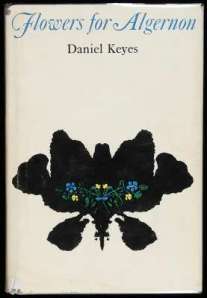Author: Daniel Keyes
Year: 1966
Nationality: American
“Dr Strauss says I shoud rite down what I think and remembir and evrey thing that happins to me from now on. I dont no why but he says its importint so they will see if they can use me.”
This week I’m going to have to cop out somewhat, as I’ve been so busy with two jobs that I haven’t had the time to read more than a chapter of anything a night. I foolishly started A Tale of Two Cities a week and a half ago thinking (based on my reading trajectory so far this year) that I’d have the time to get in that and another book in before today, but I was sadly mistaken (I’m about a third of the way through). And so that led me to my only option of reviewing a book I’ve already read.
Flowers for Algernon, a book I’ve read twice, was originally my first choice to re-read for this post anyway because I own it, I like it a lot and haven’t read it for a while, but I didn’t see any way of getting hold of my copy. I first read it for school about ten years ago and I even enjoyed it then, which I’m sure many will agree is not always the case. A few years later I found that I’d never returned my school copy by accident and saw fit to give it another go, to my great pleasure. As such I haven’t read it since then but it’s pretty well stuck in my memory.
 Flowers for Algernon is the chronicles of a young man named Charlie Gordon, seen from the perspective of his journal entries. Charlie, beset in life by an IQ of 68, works as a janitor in a bakery and is constantly used and abused by his co-workers and others. He is selected to undergo an experimental operation to permanently increase his mental capacity; the first successful patient, a mouse named Algernon, becomes Charlie’s beloved companion. The operation is a success and raises his IQ to a whopping 185, but the sudden elevation to the adult world proves difficult for Charlie as he struggles to cope with his new-found independence (not unlike Tom Hanks in Big, although far less whimsical). He encounters relationships, sex and alcohol before trying to reconnect with his family, who could not cope with him as a child. Meanwhile, Algernon begins to exhibit behaviour that suggests the procedure might not have been as permanent as everyone had hoped, and Charlie finds himself in a race against time to make the most of his intelligence in the event that it may not be his forever.
Flowers for Algernon is the chronicles of a young man named Charlie Gordon, seen from the perspective of his journal entries. Charlie, beset in life by an IQ of 68, works as a janitor in a bakery and is constantly used and abused by his co-workers and others. He is selected to undergo an experimental operation to permanently increase his mental capacity; the first successful patient, a mouse named Algernon, becomes Charlie’s beloved companion. The operation is a success and raises his IQ to a whopping 185, but the sudden elevation to the adult world proves difficult for Charlie as he struggles to cope with his new-found independence (not unlike Tom Hanks in Big, although far less whimsical). He encounters relationships, sex and alcohol before trying to reconnect with his family, who could not cope with him as a child. Meanwhile, Algernon begins to exhibit behaviour that suggests the procedure might not have been as permanent as everyone had hoped, and Charlie finds himself in a race against time to make the most of his intelligence in the event that it may not be his forever.
Personally I think this book is a must-read. The story is emotional and moving and even perhaps quite painful to read on this account as Charlie writes down his struggles in a style which evolves with his intelligence. The novel, based on a short story written by Keyes seven years previously, is relatively short and will appeal to anyone interested in fiction from the perspective of the mentally-handicapped, such as One Flew Over the Cuckoo’s Nest or the more modern Curious Incident of the Dog in the Night-Time (or even Forrest Gump. Tom Hanks galore!). It challenges perceptions of mental health without needing to diagnose Charlie as one thing or another, but even if you’re not particularly interested in that sort of thing you should still give Flowers for Algernon a go as a very worthwhile read.
My Rating: 8/10